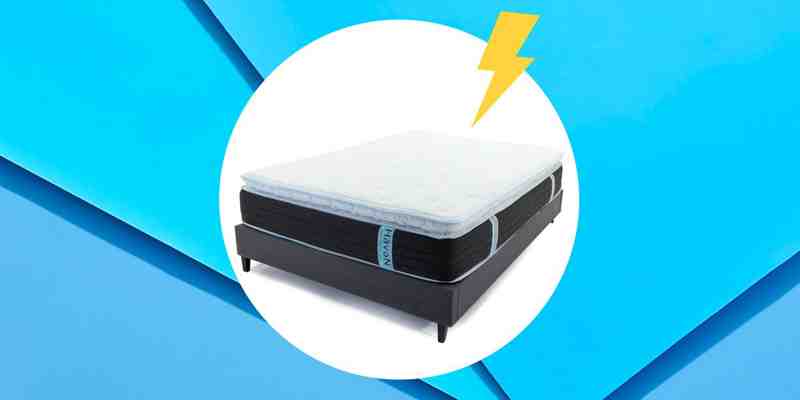19 Best Mattresses For Back Pain For 2022, According To Experts
Whether you have back pain because of an injury, surgery, or something else, it can be a total drag—that achiness can keep you up all night long. One way to make drifting off easier is to upgrade your mattress. But you may be wondering, Where do you start? It turns out, the best mattresses for back pain have a few things in common.

First and foremost, comfort is key—along with finding something that minimizes the pressure on points like your back, butt, and shoulders, says Santhosh A. Thomas, DO, the associate medical director of the Center for Spine Health at the Avon - Richard E. Jacobs Medical Center. “We spend almost a third of our life in bed, so it is important to have something that is comfortable and meets your needs for good sleep,” he adds.
Plus, how often do we really need to cycle out mattresses? There is no hard-and-fast rule, says Leda Ghannad, MD, a sports medicine physician at Midwest Orthopedics at Rush. “It depends on multiple factors such as how often you rotate the mattress, how much use you put it through, and if you use it every day versus only part of the year in a guest room.” A good rule of thumb is to purchase a new one every 10 years.
Before you dive into mattress shopping, Dr. Ghannad recommends that you first see a doctor to rule out any structural problem in your spine if you're experiencing severe back pain that prevents you from sleeping.
How To Find A Quality Mattress For Back Pain
There are a few basics to mattress shopping that all women should know about, especially if you are dealing with back pain.
Firmness. Though you'll definitely want something that's more firm than soft, exactly how firm should be determined by your body weight, says Carleara Weiss, PhD, RN, who is a member of the American Academy of Sleep Medicine. "For example, medium firmness seems ideal for people weighing approximately 130 pounds and satisfactory for back and side sleepers under 230 pounds," she explains. The higher your body weight, the more firm you may need your mattress to be, though it really depends on the individual, as sleep preferences differ from person to person (and again, comfort is king!).
Where you experience back pain also impacts what kind of firmness you should look for. "The general concept when thinking about buying a mattress is that low back pain can be alleviated with a mattress that is on the firmer end of the spectrum rather than softer or squishier," says Leigh Hanke, MD, an assistant professor of clinical orthopedics at Yale School of Medicine. If you don't wake up with low back pain and you like a softer experience, you can prob get away with a less firm mattress.
If you find yourself dealing with upper back pain, Dr. Ghannad suggests a medium-firm mattress since it provides the best support for the back and is effective for reducing pain. “ It is also important to have a supportive pillow to maintain a neutral spine position,” she says. “Memory foam pillows tend to be better at this than cotton or feather.”
Sleeping position. The way you sleep determines what areas you put the most pressure on, says Weiss, which is pretty useful information when it comes to buying a mattress. Say you're a back sleeper. You might prefer a mattress that alleviates pressure points in the lumbar (low back) area, says Weiss, and you'd likely fare better considering medium-firm mattresses, as they often provide good spine support. "On the other hand, back sleepers should avoid extra-firm mattress as those are less flexible and may fail to adjust to the lumbar curve," adds Weiss.
Stomach sleepers put pressure on their neck, in addition to the lumbar area, so they may prefer a firm mattress since it's ideal for spine support and helps alleviate neck tension (by preventing the lower body from sinking into the mattress and putting the neck at an even more intense angle).
For side sleepers, Weiss also recommends a medium-firm mattress. "Shoulders and hips are pressure points for side sleepers. A medium-firm mattress would be ideal for this sleep position while still flexible to the body curvature," she explains.
Materials. There's no one-size fits all answer for which material is best for back pain, says Weiss. Memory foam is ideal, but only when supported by a firm or medium-firm core. "A mattress exclusively made out of memory foam tends to deform and increase pressure in sensitive areas," she adds.
Then there's the hybrid mattress, which is designed so that each side of the mattress offers a different level of firmness. They tend to be super supportive. "Hybrid mattresses are growing in popularity as they promote excellent support with an innerspring core and comfort with top layers of foam, cotton, or other materials," says Weiss.
And don't rule out springs, even if they seem old-fashioned! "Their sturdy metal coils can be a good source of support," and when they're paired with a layer of foam, they can totally be comfortable, adds Weiss.
Here are 19 mattress recommendations for those who deal with back pain, straight from sleep and spine experts.